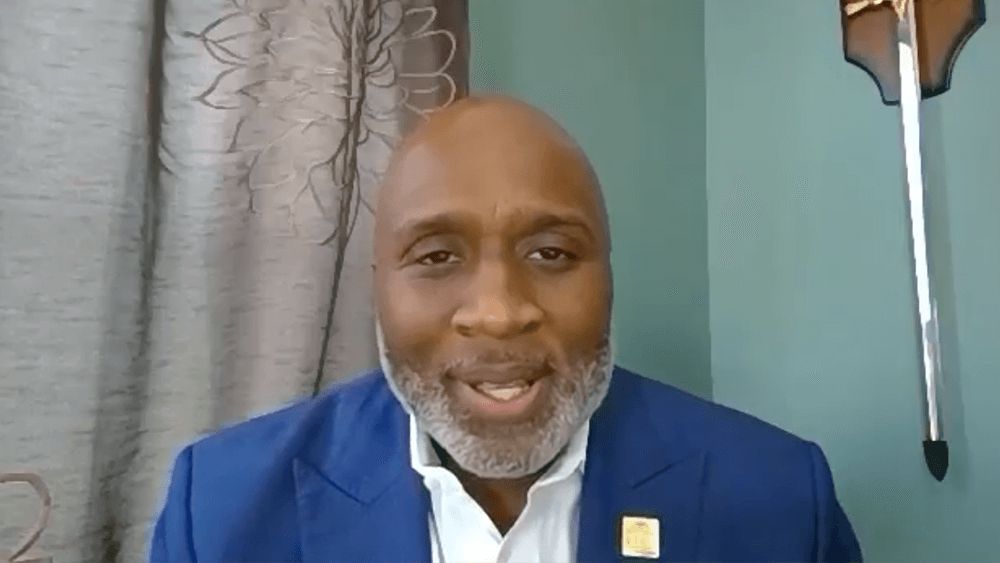
Jason Dunn, chairman of the National Coalition of Black Meeting Professionals, addresses social unrest and protests sparked by the murder of George Floyd by a police officer.
Convene interviewed Jason Dunn at the beginning of this year, just as he was embarking on his new role as chairman of the National Coalition of Black Meeting Professionals (NCBMP). When we asked him to share what he saw as the greatest challenge for the meetings industry in terms of diversity and inclusion, Dunn, who serves as the group vice president of diversity sales and inclusion at the Cincinnati USA Convention & Visitors Bureau, spoke about the need “to allow ourselves to be uncomfortable in order to have an authentic conversation.”
That was before the COVID-19 crisis. And it was well before the national social unrest and protests sparked by the murder of George Floyd by a police officer. In a video message on the NCBMP website posted on June 2, Dunn spoke about this watershed moment:
“Today, our nation is burning, and whether you agree with the protests, unrest, charges, guilt, or innocence, one thing is for sure,” he said. “Our nation is at odds, which means that we, as a people, are at odds. As a father, as a hospitality professional, as the leader of this organization, and as a Black man, I’m struggling, just like some of you, with a belief in humanity, and the possibility that maybe, hate is stronger than love and that maybe the human spirit isn’t as strong as we once believed it to be.”
He addressed that in the economic fallout from COVID-19, “many organizations and corporations … are choosing to eliminate diversity amongst their staff,” he said. “They are pushing to the side diversity strategies and violating their core values. In other words, diversity has been silenced. It has been deemed nonessential. Which means you” — speaking directly to NCBMP’s members — “have been silenced and deemed nonessential.”
Dunn pointed out that the diversity market generates an estimated $300 billion in spending. “African Americans alone make up approximately $90 billion of that total and we are one of the quickest markets to bounce back during economic struggle,” he said.
He also retraced the NCBMP’s history, saying its founders organized in 1983 to create “a platform that spoke to the inequities, the disparities and exclusion of African Americans within the industry before the word ‘diversity’ was popular. They chose to speak up for collective empowerment and blazed the trail for what is known as the diversity market and made the business case for Black tourism…. The associations and organizations that make up NCBMP were mostly founded as an answer to the economic, political, social, religious, and educational injustices of this nation. And frankly, they have increased the profile of many cities in their time of despair, set record revenue numbers within hotels, contributed to legislative policies that have changed the country, produced some of the best talent in the industry, and established legacy programs that still exist in many of our urban cities.”
Before NCBMP, Dunn said, there were no African American CEOs of CVBs, none leading convention centers, “very few general managers of hotels, and very few meeting planners of non-ethnic organizations. And there were only 15 African Americans employed within 500 CVBs at the time. This was just 37 years ago. Let that sink in a little awhile.”
Dunn then called for solidarity in the business events and hospitality industry. “If one of our members are affected, we all are affected,” he said. “And it’s just a matter of time before our industry loses its moral compass. We know that diversity is essential regardless of how uncomfortable and difficult it is perceived to be. The changing demographics of this country make the choice to ignore this fact illogical.”
At the end of his message, Dunn said that members would be receiving surveys in the coming days. “The data we will gather will help to develop a comprehensive approach to address this issue head-on,” he said. “There cannot be a new normal without NCBMP at the table — and especially without diversity.”
Michelle Russell is editor in chief of Convene.
